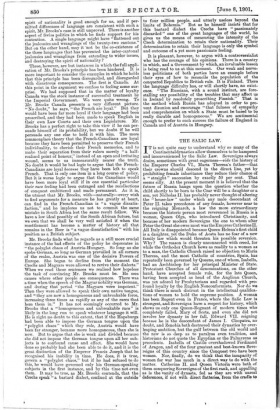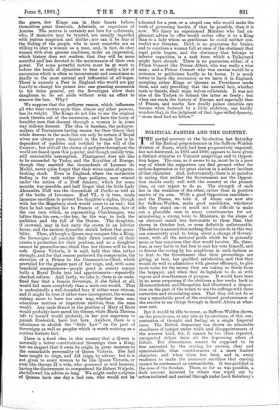THE SALIC LAW.
IT is not quite easy to understand why so many of the Continental dynasties allow themselves to be hampered and inconvenienced by the Salk Law. Sovereigns always desire, sometimes with great eagerness—vide the history of the Emperor Charles VI., Maria Theresa's father—that their crowns should descend in the direct line, yet by prohibiting female inheritance they reduce their chance of a " straight " succession by exactly 54 per cent. That seems silly. At the present moment it is believed that the future of Russia hangs upon the question whether the child shortly to be born to the Czar will be a daughter or a son, yet Nicholas IL has probably never thought of altering the " house-law " under which any male descendant of Peter II. takes precedence of any female, however near to the reigning Monarch, a law the more extraordinary because the historic person most reverenced in Russia is a woman, Queen Olga, who introduced Christianity, and because of her modern Sovereigns the one to whom after Peter the Great she owes most was the Empress Catherine IL All Italy is disappointed because Queen Helena's first child is a daughter, yet the Duke of Aosta has no fear of a new family law which would threaten his possible reversion. Why ? The reason is clearly unconnected with creed, for while the Orthodox Church bows as readily to a woman as to a man, the Catholic Church raised no objection to Maria Theresa., and the most Catholic of countries, Spain, has repeatedly been governed by Queens, one of whom, Isabella, had an Archbishop for her principal Minister of State. Protestant Churches of all denominations, on the other hand, have accepted female rule, for the late Queen, having been accepted as head of the Anglican Church, was yet adored by Presbyterians and regarded with pro- found loyalty by the English Nonconformists. Nor do we think there is much distrust in the intellectual qualifica- tions of women to hold the supreme position. A woman has been Regent even in France, where the Salk Law is strongest, and Sovereigns have a respect for history, which shows us only one Queen-Regnant of modern times who completely failed, Mary of Scots, and even she did not involve her dynasty in her fall, Edward VII. reigning because he is the descendant of James I. Cleopatra, no doubt, and Zenobia both destroyed their dynasties by over- leaping ambition, but the gulf between the old world and the new is so deep as to paralyse even tradition, and historians do not quote the Egyptian or the Palmyrene as precedents. Isabella of Castile overshadowed Ferdinand of Aragon, and of the four greatest and. best-known Sove- reigns of this country since the Conquest two have been women. Nor, finally, do we think that the incapacity of women for war has much in a direct way to do with the matter. Catherine II. and Queen Victoria were both of them conquering Sovereigns of the first rank, and appalling as is the vanity of dynasts, fed as they are with unreal deferences, if not with direct flatteries, from the cradle to the grave, few Kings can in their hearts believe themselves great Generals, Admirals, or organisers of Armies. The motive is certainly not love for collaterals, who, if memoirs may be trusted, are usually regarded. with jealous suspicion and dislike ; nor can it be fear of the feeling of the people, who in most countries are as willing to obey a woman as a man, and, in fact, do obey women with even greater readiness, under an impression, which history does not confirm, that they will -be more merciful and less devoted to the maintenance of their own power. Yet some powerful motive must be at work to mduce the heads of dynasties to bear so easily a law of succession which is often so inconvenient and sometimes so deadly to the most natural and influential of all hopes. There is scarcely a Peer in England who would not pay heavily to change his patent into one granting succession to his heirs general, yet the Sovereigns allow their daughters to be set aside without even an effort to remove the ban. Why?
We suppose that the pedigree reason, which influences all who wear crowns more than almost any other persons, has its weight. The Kings do not like to see the original stock thrown out of the succession, and have the fancy of humbler men that descent through a woman is in some way indirect descent. The idea is baseless, the pedigree- makers of Travancore having reason for their theory that while descent in the male line can only be certain if Royal wives are always pure, descent in the female line is in- dependent of qualities and. certified by the will of the Creator ; but still all the claims of pedigree throughout the world are based upon this popular, and though usually true, still unscientific assumption. Plantagenet does not like to be succeeded by Tudor, and the Royalties of Europe, though they married the descendants of Lorenzo de Medici, never quite forgot that their wives came of apawn- broking stock. Even in England, where the instinctive feeling is for rank rather than pedigree, men winced under the notion of a Duff dynasty, which for some months was possible, and half forgot that the little Lady Alexandra Duff was the descendant of Cerclic as well as of the bailie of Inverness. Karl VI., it is true, made immense sacrifices to protect his daughter's rights, though with her the Hapsburg stock would come to an end ; but then he had married her to Francis of Lorraine, heir of the one race which, as representing Charlemagne, was loftier than his own,—the key, by the way, to both the ambition and the fall of the Guises. The daughter, if crowned, may in fact carry the crown to an inferior house, and the ancient dynasties shrink before that possi- bility. Then, although a Queen may conquer like a King, the Sovereigns all consider their direct control of their armies a protection for their position, and. as a daughter cannot be generalissimo, think that her throne will be less safe. Queen Victoria, it is said., held that idea rather strongly, and for that reason preferred the compromise, the elevation of a Prince to the Command-in-Chief, which prevailed for the greater part of her reign, and, with some beneficial consequences—people great in society cannot bully a Royal Duke into bad appointments—repeatedly checked reform. And lastly, we take it, there is an unde- fined fear that a female Sovereign, if she failed at all, would fail more completely than a male one would. That is undoubtedly a well-founded fear if either were vicious, and it might be true if either were incompetent, the woman risking more to have her own way, whether from con- scientious motives or imperious motives, than the man would. Any male Stuart in the position of Mary of Scots would probably have saved his throne, while Maria Theresa left to herself would probably, in her just eagerness to punish Frederick, have lost hers. Anyhow, there is a reluctance to abolish the " Salic Law" on the part of Sovereigns as well as peoples which is worth noticing as a curious historic fact.
There is a fixed idea in this country that a Queen is naturally a better constitutional Sovereign than a King, but we suspect that it owes its origin in great measure to the remarkable personality of Queen Victoria. She had been taught to reign, and did reign, by advice; but it is not given to every woman to be like Queen Victoria, or even like George Lt.'s wife, who governed so well because, having the discernment to comprehend Sir Robert Walpole, she followed his advice so long. We might under a regime of Queens have one day a bad one, who would not be tolerated. for a year, or a stupid one, who would make the work of governing harder, if that be possible, than it is now. We fancy an experienced Minister who had un- pleasant advice to offer would rather offer it to a King than to a lady whom as gentleman he could neither con- tradict nor threaten. Birth is no guarantee for brains, and to convince a woman full at once of the obstinacy that regal pride begets, and the obstinacy that belongs to inferior capacities, is a task from which a 'ralleyrand might have shrank. There is no guarantee, either, of a Prince Consort like Prince Albert, who was really a wise man ; and a Prince Consort who was unwise would be a nuisance to politicians hardly to be borne. It is much better to leave the succession as we leave it in England, accepting either Kings or Queens as Providence sends them, and only providing that the natural heir, whether male or female, shall reign before collaterals. It was not nice of the Tudors to behead the latter so freely ; but when one reads the history of Europe, and especially that of France, and. marks how deadly palace enmities can become when fostered by a little ambition, one hardly wonders that, in the judgment of that tiger-willed dynasty, "stone dead had no fellow."







































 Previous page
Previous page